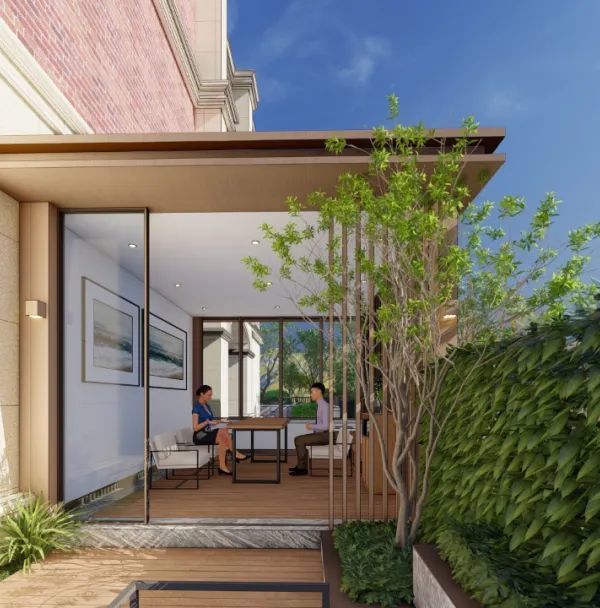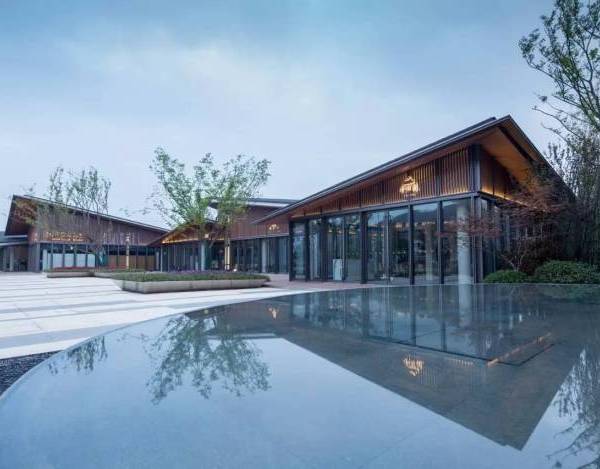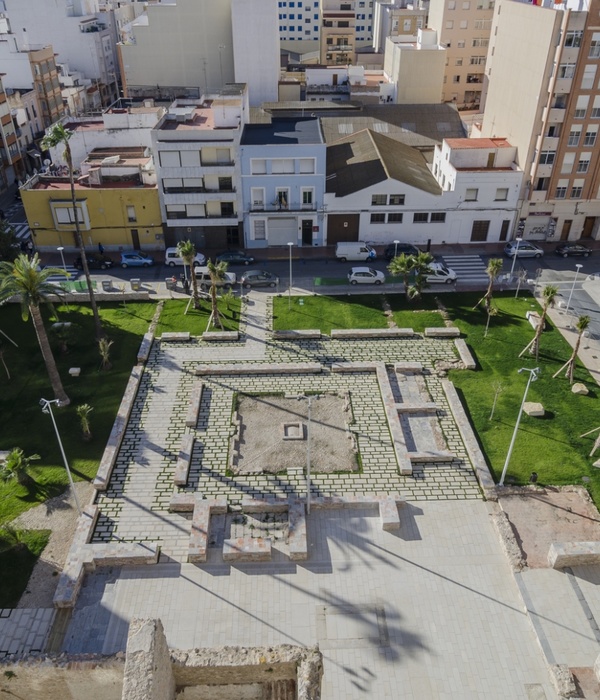- 项目名称:成都宸嘉·嘉佰道
- 业主单位:宸嘉发展
- 景观面积:11471㎡
- 项目地址:成都市锦江区
- 景观设计:WTD纬图设计
- 景观施工:吉盛园林
- 摄影:xf photograph
嘉佰道位于成都城中央腹地东一环,其前身是阿玛尼艺术公寓,从建筑外立面到室内空间设计,均由乔治 · 阿玛尼先生亲自执笔。作为阿玛尼全球第二个住宅项目,曾声名赫赫后又几经波折,成为成都著名的烂尾楼项目,如今被宸嘉集团收入,重新对其建筑/景观/室内进行升级改造。
▼项目视频,project clip © xf photograph
Jiabaidao is located in the central area of Chengdu, China, on the eastern first ring road. Its predecessor was the Armani Art Apartments, with both the exterior facade and interior design personally penned by Mr. Giorgio Armani. As Armani’s second residential project globally, it had a prestigious reputation but faced several setbacks, becoming a famous unfinished building project in Chengdu. It is now owned by the Chenjia Group, which is undertaking upgrades and renovations to its architecture, landscape, and interior.
▼项目概览,overview of the project © xf photograph
建筑形态以两座傲立的“双子塔”将空间划分为一个大中庭和五个边角空间。身在老城区,独特的建筑气质也愈发凸显出场地外围界面老旧、围界过于密闭压抑的逼仄感。在建筑的分隔下,空间更显得狭小局促,视线单调。几个边角空间较为零碎,功能和体验性差。场地内部消防硬质占比过多,风井、采光井等立面构筑多,破坏景观整体性。基于以上现状,在整个空间逻辑的生成过程中我们首先需考虑如何从项目周边老旧的城市氛围中跳脱出来,进入到一种与门外截然不同的,沉浸式的,自然静谧的,充满艺术气质的空间中。其次,如何利用景观的手法去软化消防硬质,将其摇身一变为景观的一部分,在狭小的空间中最大化环游流线和视距,构建出层次丰富的景观画面,这是设计面临的两大命题。
The architectural form consists of two towering “twin towers” that divide the space into a large central courtyard and five corner spaces. Being in the old city area, the unique architectural style highlights the contrast between the worn-out surroundings and the overly enclosed and oppressive perimeter. The division created by the architecture makes the space appear cramped and visually monotonous. The corner spaces are fragmented, lacking in functionality and experiential qualities. There is an excessive presence of rigid fire protection elements within the site, such as wind shafts and light wells, which disrupt the overall landscape. Based on the current situation, in the process of generating the overall spatial logic, our first consideration is how to break away from the old urban atmosphere surrounding the project and enter a space that is completely different from the outside, immersive, naturally tranquil, and full of artistic temperament. Secondly, we need to use landscape techniques to soften the rigid fire protection elements and transform them into part of the landscape. This will help maximize circulation routes and sightlines in the narrow space and create a landscape with rich layers. These are the two major challenges faced in the design.
▼场地原始图,before renovation © xf photograph
▼俯瞰庭院,aerial view of the garden © xf photograph
建筑立面灵感源于中国的兰草意象“芝兰生于丛林,不以无人而不芳”。景观延续建筑的语言,以“兰草”为符号,其扎根的纵向拓展和茂盛蔓延的横向扩散形成设计思路,让建筑与景观产生链接,犹如一个向上生长的生命共同体。由此,一个关于自然秘境与水下森林的构想应运而生——摇曳的兰草从建筑立面肆意生长,蔓延到地面,扎根至水里,充满轻盈的流动感。
▼方案生成分析,generation analytical diagram
The inspiration for the architectural facade comes from the Chinese orchid imagery: “The orchid thrives in the forest, radiating its fragrance even when no one is around.” The landscape continues the language of the architecture, using the orchid as a symbol. Its vertical expansion and lush horizontal spread form the design concept, connecting the architecture and the landscape like a growing community. From this concept, an idea of a natural haven and an underwater forest emerged. Swinging orchids grow freely from the building facade, spreading to the ground, rooting in the water, and creating a sense of lightness and flow.
▼核心水景庭院,main water garden © xf photograph
▼亭子,pavilion © xf photograph
着眼场地,入口与建筑主体形成三角布局,空间均衡稳定,有着最长视距。在有限的空间中,我们选择从两边入户获得最大环游流线和视距,使中庭面积最大化,迂回流线带来最佳游园体验。通过细致的视线点位分析去控制景观的疏与堵,结合近景、远景、中景的构成与框景、借景的运用,构建每一处视角的完整性。
With a focus on the site, the entrance and the main building form a triangular layout, ensuring balanced and stable spaces with the longest sightlines. In the limited space, we chose to enter from both sides to achieve the maximum circulation routes and sightlines, maximizing the size of the central courtyard and providing an optimal park experience through meandering pathways. By carefully analyzing the viewpoints, we control the distribution of open and enclosed spaces in the landscape, combining the composition of foreground, background, and middle-ground with the use of framing and borrowing views, creating complete perspectives in every direction.
▼俯瞰中庭路径流线,aerial view of the path of garden © xf photograph
我们将建筑灵动的线条感延续到入口设计,独特的拱状艺术造型加入灵动跳跃的“鳞”形符号,彰显出清新的自然活力感。入口构筑采用全界面3D曲面铝板,金灰的雅致配色,形成与建筑的遥相呼应。一扇玻璃屏风,影影绰绰透出院内水院的光影婆娑和绿漾摇曳,晕染出门后的旖旎世界。
We extend the dynamic lines of the architecture to the entrance design, incorporating a unique arched artistic form and a dynamic “scale” symbol, showcasing a fresh and vibrant natural vitality. The entrance is constructed using full-surface 3D curved aluminum panels with an elegant gold-gray color scheme that echoes the architecture from a distance. A glass screen allows glimpses of the shimmering lights and swaying greenery of the courtyard’s water features, creating a picturesque world beyond the entrance.
▼入口独特的拱状艺术造型,a unique arched artistic form of the entrance © xf photograph
▼入口细部,detail of the entrance © xf photograph
参数化设计的菱形渐变格栅围界呈现半透明的视觉效果,如同漂浮在林中的金色缎带。围墙材质采用温德姆灰石材作为硬隔离,结合原产于马来西亚的油棕榈树群作为围界软隔离。4.2米的围界高度划分出内外边界,在开合张弛间,既划分住宅与城市的距离,又创造出流动互生的自然过渡。
A parametrically designed diamond gradient grille fence presents a translucent visual effect, resembling golden ribbons floating in a forest. The wall material uses warm grey stone as a hard boundary, combined with a soft boundary formed by palm tree groves native to Malaysia. The 4.2-meter fence height defines the inner and outer boundaries and creates a natural transition with opening and closing movements, not only separating the residences from the city but also fostering a fluid and interconnected transition with nature.
▼菱形渐变格栅围界,diamond gradient grille fence © xf photograph
除了硬质围界,植物也作为软围界起到屏蔽周边环境的作用。在卢梭的画中,我们看到了由植物包裹围合出的浓郁风情感,这与项目气质高度吻合。我们对卢梭的艺术画作《梦》《林中散步的妇人》《赤道丛林》等经典名作进行提取和转换,以自然为画布,以植物为画笔,利用植物的形态、颜色、质感、组合方式等特质,再现画中的主题与色彩,如临艺术殿堂。
Apart from hard boundaries, plants also serve as soft boundaries to shield the surrounding environment. In Rousseau’s paintings, we can see the rich atmosphere created by the enveloping plants, which perfectly aligns with the project’s character. We extract and transform classic masterpieces from Rousseau’s art, such as “The Dream,” “The Woman Walking in the Forest,” and “The Equatorial Jungle.” Using nature as a canvas and plants as brushes, we utilize the characteristics of plants, including their forms, colors, textures, and compositions, to recreate the themes and colors of the paintings, as if entering an art palace.
▼以卢梭画作为植物庭院灵感,plant garden inspired by paintings by Rousseau
▼植物庭院,plant garden © xf photograph
▼园中植物配景,plant cluster in the garden © xf photograph
其中,水泽花园的设计借由卢梭《林中散步的妇人》,以艺术水幕墙的设计,运用多品类的植物、石材、金属等不同材料创造出一种新颖、别具一格的流动景观效果。
Among them, the design of the Water Meadow Garden draws inspiration from Rousseau’s “The Woman Walking in the Forest.” With the design of an artistic water curtain wall, we use various categories of plants, stones, metals, and other materials to create a novel and unique flowing landscape effect.
▼园中路径与雕塑家具, path and sculptural furniture in the garden © xf photograph
▼俯瞰植物庭院, top view of the plant garden © xf photograph
景观将丛林搬进都市,通过游园的景观序列组织,实现沉浸式自然。步移景易,心绪随不同场景转换而变化流转,在有限的空间中创造出与自然无界共栖的连接。
Bringing the jungle into the city, the landscape organizes immersive nature through a sequence of garden scenes. The shifting of views and the changing of emotions accompany the transitions between different scenes, creating a connection with boundless coexistence in a limited space.
▼植物细节,detail of the plant © xf photograph
如油画一般一幅幅舒展开的景观画面逐渐从空间中呈现,浓郁的质感、色调、气味,让人犹如置身画中,被一个静谧的艺术的景观空间所围绕。在光,树,影,水的协奏下,共同编织出一曲空间交响曲。
Like an unfolding landscape painting, the scenes gradually emerge from the space, with rich textures, tones, and scents, immersing people in the painting, surrounded by a serene artistic landscape. Through the symphony of light, trees, shadows, and water, a spatial symphony is woven together.
▼艺术雕塑,sculpture © xf photograph
▼水面上的艺术雕塑,sculpture on the water © xf photograph
自然秘境与水下森林的构想源于莫奈的《睡莲》,碧绿的水面从立面上延伸了空间的纵深感,也让原本硬质的消防硬质界面转换为景观元素的一部分。我们以不同标高的叠级水景、池底图案、水草等来丰富层次,获得水域深浅明暗变化。
The concept of a natural paradise and underwater forest is inspired by Monet’s “Water Lilies.” The emerald green water extends the sense of depth in the vertical dimension and transforms the originally rigid fire-hardened interface into a part of the landscape elements. We enrich the layers with cascading water features at different elevations, patterns on the pool floor, aquatic plants, etc., to achieve variations in water depth and brightness.
▼以莫奈的《睡莲》为灵感,inspired by Monet’s Water Lilies
▼莫奈的《睡莲》与实景,Water Lilies by Monet and the real scenery © xf photograph
我们将水面视作一块画布去进行构图与创作,浅水面更多以反映自然天光为主,在微风拂过时,构成多层次的摇曳动态。深水区则尝试还原如九寨沟的水一般通透的质感与蓝绿的色彩。最深的水底处,我们采用亚马逊大花绿,将大花绿打碎放置在池底,与丰富的水生植物搭接在一起,共同形成深邃的墨绿色。不同层次的水面形成色彩的过渡,材质天然的色彩和纹理也使整片水面获得自然的动感效果。
We consider the water surface as a canvas for composition and creation. Shallow water surfaces primarily reflect natural skylight, forming a multi-layered and swaying dynamic when the breeze passes through. In the deep-water zone, we strive to reproduce the transparent texture and blue-green color, reminiscent of Jiuzhaigou’s water. At the deepest underwater area, we use large water lilies to break up and place at the bottom of the pool, combining them with abundant aquatic plants to create a deep emerald green. The different levels of the water surface create color transitions, and the natural colors and textures of the materials give the entire water surface a dynamic effect.
▼睡莲近景,close-up of the water lilies © xf photograph
在户外观察水体的角度一般来说是非常有限的,以至于我们通常所营造的水体景观无论是传达意图和建构思维都受到了一定程度的局限。所以我们尝试更换视角,在生态池底之外加了一个10mx0.8mx0.8m的透明亚克力生态草缸,通过亚克力超白缸体从侧面切入,近距离观察水面以下的生态系统状态。户外生态草缸的实现过程是我们面临的一大难题。室外的温湿度、光照、紫外线强度都和室内截然不同,不同的水下环境有着迥异的构成,独特的生态,因此需要针对性选择不同的水下生态融入设计。草缸里面用的水草泥,泥的厚度,水流方向,水草类别,生长周期,组合形态,构图方式,水面和池底的清澈度都需要逐一推敲。
The perspective for observing outdoor water bodies is generally limited, to the extent that the water landscape we usually create is somewhat constrained in conveying intent and conceptual thinking. Therefore, we attempted to change the perspective by adding a transparent acrylic eco-tank measuring 10m x 0.8m x 0.8m outside the ecological pool. Through the ultra-white acrylic tank, we can observe the ecosystem below the water surface up close from the side. The implementation of the outdoor eco-tank posed a major challenge for us. Outdoor temperature, humidity, light intensity, and UV radiation are significantly different from indoor conditions, and different underwater environments have distinct compositions and unique ecosystems. Therefore, we need to selectively choose different underwater ecologies to incorporate into the design. Factors such as the aquatic soil used in the tank, the thickness of the soil, water flow direction, types of aquatic plants, growth cycles, composition forms, clarity of the water surface and pool bottom all require careful consideration.
▼户外生态水缸,outdoor eco-tank aquarium © xf photograph
水下造景的植物选用0度以上水温即可存活的粗放化管理品种,如:睡莲、水兰、菹草、苦草、蜈蚣草、虎耳草等。而生态草缸的植物为需要将水温控制在20度左右的精细化管理品种,如:绿九冠、黑木蕨、雨裂水蓑衣、丹麦铁皇冠等,水生动物则是以消解藻类、漂悬浮物、有机质为主,如:食蚊鱼、中华青鳉、长麦穗鱼等。波光潋滟中,水草婀娜。落日微降,光影交织,随着层次的线条漫入深处,如同一场酣甜的美梦盛开。
Plants used in underwater landscaping are robust species that can survive above 0 degrees Celsius, such as water lilies, water orchids, water hyacinths, reeds, centipede grass, and arrowhead plants. The plants in the eco-tank require precise management and need to maintain a water temperature of around 20 degrees Celsius. Examples of such plants include green crown anemone, black fern, water moss, and Danish water crown. As for aquatic animals, they mainly consume algae, suspended matter, and organic matter, such as mosquito fish, Chinese bream, and long-tailed loach. Amidst the shimmering waves, the aquatic plants sway gracefully. As the sun sets, light and shadows interweave, gradually fading into the depths with layers of lines, like a sweet and blooming dream.
▼生态水缸近景,close-up of the ecological tank © xf photograph
草缸“观鱼”是观与被观的问题,两个不同世界只隔着一层玻璃,让我们不同生物之间互相注视、互动,而又都在自己的世界和环境里存在。当我们在这层如镜的界面上看到了对方和自己的投影时,“镜”就变成了“境”,内和外的错觉可以让我们沉浸其中感受自我,感受彼此,体悟人生的哲学意境。
The “Fish Watching” eco-tank poses a question of observation and being observed. Two different worlds are separated by a layer of glass, allowing different creatures to gaze and interact with each other while existing in their own worlds and environments. When we see our reflections and the reflections of others on this mirror-like interface, the “mirror” becomes the “realm,” creating an illusion of the internal and external. This immersion allows us to experience ourselves and each other, and grasp the philosophical aesthetic of life.
▼观与被观,observation and being observed © xf photograph
在自然与野性的欲望都市中呈现一个小而精、精而美名画质感园林,宸嘉嘉佰道景观以延续建筑“兰草”的语言,将名画质感的空间气质从底层的自然谧境一直延伸至顶层空中花园,构建出一个蓬勃生长的生命共同体,重构我们对于生活、自然、艺术的主张。
In the desire for a small yet refined, exquisite and beautiful landscape in the urban realm of nature and wildness, Chenjiajiabai Dao Landscape extends the language of architectural “orchids.” The spatial atmosphere of a high-quality painting is extended from the natural tranquility of the lower level to the rooftop garden, constructing a vibrant community of life, and reconstructing our proposition regarding life, nature, and art.
▼平面图,plan © WTD Weitu
项目名称:成都宸嘉·嘉佰道
业主单位:宸嘉发展
景观面积:11471㎡
项目地址:成都市锦江区
景观设计:WTD纬图设计
设计团队: 李卉 张黎 李彦萨 范玮 田乐 李理 张华盛 张书桢 宋照兵 王若懿 梁爽 郭燕 张雪琨 王巧铃 张涛 侯茂江 周芯宇 赵桐 王园园 张燕 范执鸿 王玥 余红燕 简梦婕 谷雨 薛凤仪 董瑜 庞虹宇 朱明莉 姚淞骅
景观施工:吉盛园林 结构幕墙
顾问团队:陈剑锋博士团队
草缸顾问:李栩
水生态:重庆镜内生态环境工程有限公司 董陈志峰
建筑改造:上海恩威建筑设计有限公司
建筑泛光设计:胜乐照明设计
雕塑作品艺术家:向京
摄影:xf photograph
建成时间:2023.01
{{item.text_origin}}












